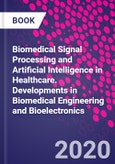Biomedical Signal Processing and Artificial Intelligence in Healthcare is a new volume in the Developments in Biomedical Engineering and Bioelectronics series. This volume covers the basics of biomedical signal processing and artificial intelligence. It explains the role of machine learning in relation to processing biomedical signals and the applications in medicine and healthcare. The book provides background to statistical analysis in biomedical systems. Several types of biomedical signals are introduced and analyzed, including ECG and EEG signals. The role of Deep Learning, Neural Networks, and the implications of the expansion of artificial intelligence is covered. Biomedical Images are also introduced and processed, including segmentation, classification, and detection. This book covers different aspects of signals, from the use of hardware and software, and making use of artificial intelligence in problem solving.Dr Zgallai's book has up to date coverage where readers can find the latest information, easily explained, with clear examples and illustrations. The book includes examples on the application of signal and image processing employing artificial intelligence to Alzheimer, Parkinson, ADHD, autism, and sleep disorders, as well as ECG and EEG signals. Developments in Biomedical Engineering and Bioelectronics is a 10-volume series which covers recent developments, trends and advances in this field. Edited by leading academics in the field, and taking a multidisciplinary approach, this series is a forum for cutting-edge, contemporary review articles and contributions from key 'up-and-coming' academics across the full subject area. The series serves a wide audience of university faculty, researchers and students, as well as industry practitioners.
Please Note: This is an On Demand product, delivery may take up to 11 working days after payment has been received.
Table of Contents
1. Introduction to biomedical signal processing and artificial intelligence2. Characterization of biomedical signals: Feature engineering and extraction
3. Supervised and unsupervised learning
4. Machine learning in biomedical signal processing with ECG applications
5. Deep EEG: Deep learning in biomedical signal processing with EEG applications
6. Fuzzy logic in medicine
7. Neural network applications in medicine
8. Analysis and management of sleep data








